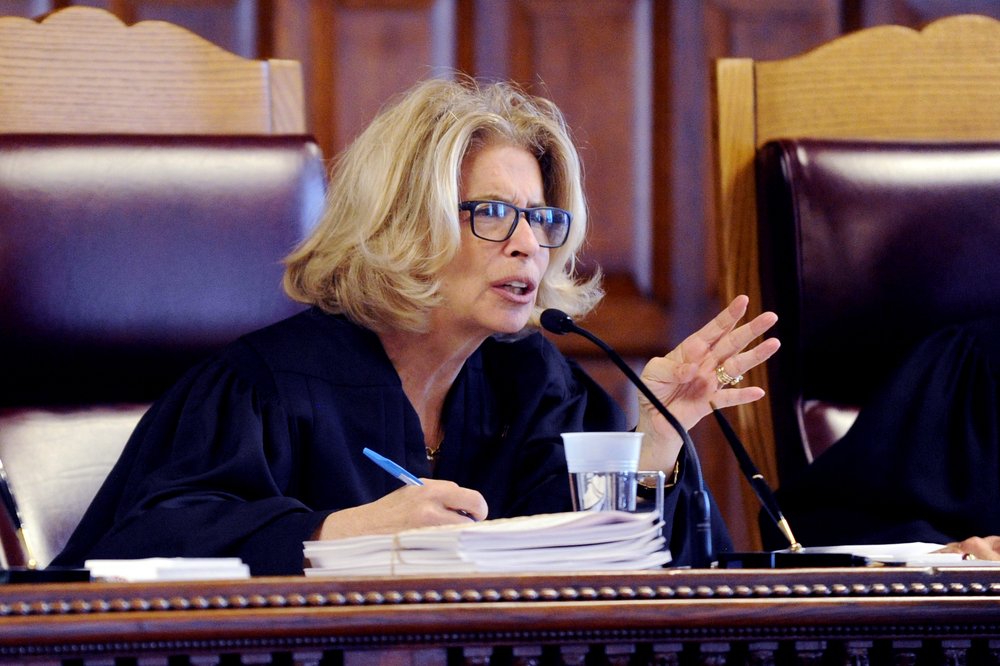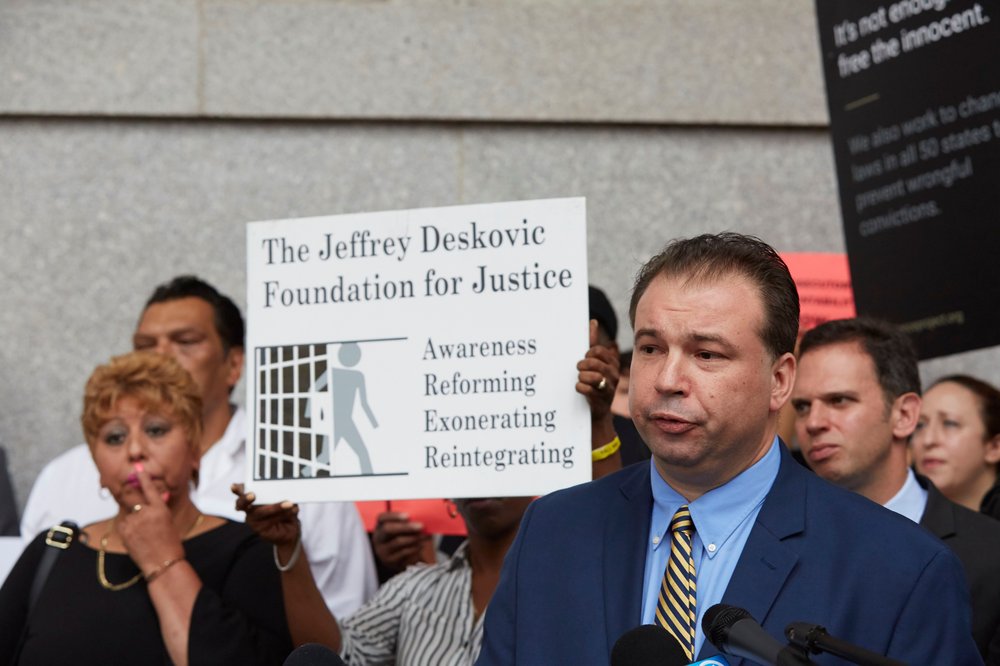As New York State's top judge prepares to head for the exit, an old case shares the spotlight
Aug. 29, 2022, 5 a.m.
Years ago, as Westchester County DA, Janet DiFiore helped free Jeffrey Deskovic from prison; now he calls her later tenure as top judge a failure.

New York Chief Judge Janet DiFiore will step down this week after leading the state’s highest court for the last six years.
It has not exactly been a soft landing.
Gov. Kathy Hochul was among those who praised DiFiore’s public service, particularly noting her leadership in steering the sprawling court system through the pandemic. DiFiore’s predecessor, Jonathan Lippman, told The New York Times DiFiore “took each case as they came” and called her a “ strong leader.”
But there have been broadsides from fellow Democrats in the Legislature. Some of them chafe over court rulings that, among other things, derailed their plans for redrawing congressional districts.
State Sen. Michael Gianaris, a Democrat and the chamber’s deputy leader, told Gothamist that DiFiore and “the three judges that always side with her” had moved New York backward on justice reform, decision-making, and transparency.
She also leaves amid a widely reported ethics investigation. DiFiore and Dennis Quirk, president of the New York State Court Officers Association, got into a dispute over vaccine mandates that escalated into a noisy, public airing of unrelated allegations.
But perhaps some of the most stinging and harshest criticism has come from a perhaps surprising source, exoneree Jeffrey Deskovic, 48, who spent 16 years in prison for a rape and murder he did not commit.
His sensational case first came before DiFiore in 2006, when she was Westchester County district attorney, and ultimately helped spur his release.
My argument is that she should have did a lot more after that.
Jeffrey Deskovic
Deskovic’s case – an ordeal that has been featured in numerous articles, TV reports, TED Ex Talks, and has even been given documentary treatment – thrust Deskovic and DiFiore into a shared spotlight that has dimmed little in the intervening years.
Now he calls her tenure “a complete failure.”
A death in Peekskill
In 1991, Jeffrey Deskovic was convicted in the 1989 rape and murder of his Peekskill High School classmate, 15-year-old Angela Correa, whose body was discovered in a wooded area of Hillcrest Park, covered with leaves. Deskovic was just 16 at the time of the crime, which shocked the Westchester County community.
No eyewitness identified him as the killer. No physical evidence tied him to the case. In fact, seminal fluid and extraneous hairs left behind excluded Deskovic as their source.
What prosecutors did have was a confession from Deskovic, made without a parent or attorney present, and which he later recanted. He was convicted and sentenced to a term of 15 years to life.
Fast forward many years. Deskovic’s appeals were exhausted. He repeatedly asked a new Westchester DA – Jeanine Pirro, now a Fox News personality – to run the crime scene evidence through state and federal DNA databases.
Pirro refused, time and again. Finally, in 2006, with help from lawyers with the Innocence Project, Deskovic made the same pitch to Pirro’s successor as DA – Janet DiFiore.

DiFiore agreed to the DNA database check – and she later consented to Deskovic’s release after there was a DNA hit or match in the database — to a man serving a life sentence for a murder that occurred years after Correa was killed.
“She agreed to have the conviction overturned – that was on Sept. 22, 2006,” Deskovic said. “By that point, I had been incarcerated for 16 years."
The real killer – his name was Steven Cunningham – confessed and ultimately pleaded guilty to the killing that had sent Deskovic away. Imprisoned when he was barely old enough to drive, Deskovic was freed at the age of 33.
DiFiore changed her mind
Following Deskovic’s reversal in fortune, DiFiore at first described the original case as “righteously” investigated and prosecuted.
And she initially refused calls for an independent review of what went wrong so many years earlier. Prosecutors very often resist second-guessing when the system misfires in such spectacular fashion, making any kind of review rare.
But then DiFiore relented. She changed her mind and allowed an independent review – a decision that led to a trove of information about ruptures in the criminal justice system.
The independent review ordered by DiFiore was conducted by a four-member panel consisting of two retired judges, a former Richmond County district attorney, and a supervising attorney with the Legal Aid Society of New York City.
[Janet DiFiore, as Westchester district attorney] chose to take another look at a case that she had no legal obligation to do so, and by so doing, literally saved Jeffrey Deskovic’s life. Not changed his life, saved his life.
Lucian Chalfen, spokesman for NY Chief Judge Janet DiFiore
Their work yielded a 35-page report in 2007 that read like a road map to injustice.
It identified police and prosecutorial failures, including a “tunnel vision” that had them singularly focused on Deskovic based on an NYPD “offender profile” that turned out to be way off base.
Police and prosecutors did “little or nothing” to corroborate their theories of the case and square them with the evidence, according to the report. This included reliance on unsupported explanations for the origins of the seminal fluid and hair left behind.
The report pointed to “troubling tactics” by police in dealing with Deskovic – exploiting his youth, naivete, inexperience, and what it called his “psychological vulnerabilities.”
Prosecutors were faulted for taking the case before a grand jury before the results of DNA testing were in. Later, when the results didn’t match Deskovic, they simply came up with other theories to account for the evidence.
The report highlighted mistakes as well by the defense, including a lack of due diligence, and by the court, which lost key evidence.
Their report provided Deskovic’s lawyers a running start in their lawsuits to follow.
“It contributed to the thought process of my civil rights lawyers as a direction to go, sure,” Deskovic said. “It was used by them in that way, in that fashion.”
A big payout
Legal actions brought by Deskovic’s lawyers following his exoneration brought in $24 million, “soup to nuts,” as Deskovic puts in; and it could have been even more. That figure is essentially what Deskovic settled for, including after a jury came back with a $41 million verdict against New York state, Westchester County, Westchester County Legal Aid, and Peekskill.
Deskovic used some of those proceeds to launch the Deskovic Foundation, which now assists those pressing wrongful conviction claims.
He said the foundation has helped get 11 people home from behind bars. That includes three exoneration cases; other cases are in various stages of process.
And Deskovic doesn’t just talk about wrongful convictions. In the years since his own exoneration, Deskovic went to college and then law school, to become a lawyer. Now he helps represent clients asserting innocence claims.
“We have nine cases going right now and we’re currently pursuing policy work in New York, Pennsylvania, and California,” Deskovic said.
But he still has differences with DiFiore, which he also laid out in a USA Today Network opinion piece. The justice advocate takes issue with DiFiore’s decisions in cases tangentially related to his own ordeal, as well as decisions that have come down from the Court of Appeals that have been unfavorable to those seeking conviction appeals. And he notes that the Deskovic report was about more than his case.
The report, a to-do list presumptively for the executive and legislative branches as well, made recommendations for systemic reforms, including requiring the recording of all police interrogations in their entirety; requiring, in most circumstances, DNA searches like the one that ultimately freed Deskovic; and urging the Legislature to create a commission of inquiry to deal with cases like Deskovic’s – to learn what went wrong and recommend fixes, including legislation.
His complaint – one echoed by Gianaris in an interview – is that DiFiore didn’t use her bully pulpit to champion for more of the broad reforms advocates see as key to preventing and undoing wrongful convictions, including eliminating all exceptions for recording police interrogations.
Deskovic said DiFiore’s commissioning of his independent report was “laudable,” but he adds, “My argument is that she should have did a lot more after that.”
Lucian Chalfen, DiFiore’s longtime spokesperson, said in an email that it was inaccurate for Deskovic to say the chief judge was not a “champion of fairness or integrity in the justice system.”
He noted that DiFiore was a founding co-chair – and, as chief judge, the leader – of the New York State Justice Task Force, one of the first permanent task forces in the nation to address wrongful convictions. He said DiFiore also expanded the task force’s mission to provide recommendations to “improve the criminal justice system.” A statement Thursday from Fordam Law School's Feerick Center for Social Justice credited DiFiore with a host of reforms ranging from identifying racism and bias in the courts to bolstering trust and confidence in the justice system.
Chalfen added further that DiFiore, in her role as DA, “chose to take another look at a case that she had no legal obligation to do so, and by so doing, literally saved Jeffrey Deskovic’s life. Not changed his life, saved his life.”
Her resignation takes effect on Wednesday.